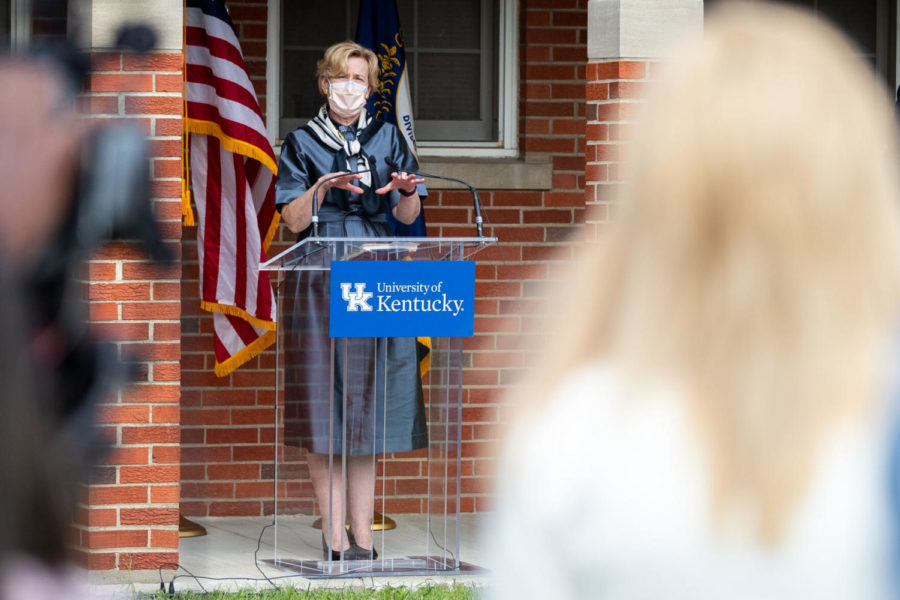White House Coronavirus Task Force representative applauds UK’s COVID response, encourages campus to stay open
September 14, 2020
A month into the campus reopening, a member of the White House’s Coronavirus Task Force advised the university to remain open for the entirety of the fall semester.
In a press conference on Monday, Dr. Deborah Birx, selected by the Trump administration to act as the nation’s Coronavirus Response Coordinator, spoke to a panel of reporters about Kentucky’s response to the virus.
Birx is a widely esteemed physician who specializes in immunology and global health research, with decades of experience fighting against the HIV/AIDS epidemic for both the CDC and the Department of Defense.
Throughout her career, Birx has earned a myriad of accolades for her pioneering research and leadership, including the CDC’s William C. Watson, Jr. Medal of Excellence and the DoD’s Legion of Merit Award.
During her visit to UK, Birx said she observed a majority of students following CDC guidelines on campus, as well as an “incredibly sophisticated system” adopted by UK for contact tracing. She applauded the university for their summer planning, which included students in the dialogue.
“There’s really a comprehensive plan that’s being executed,” she said.
As long as UK maintains the capacity to detect and isolate cases, contact trace and quarantine contacts and care for positive cases, they do not need to consider going online, Birx said.
“It’s actually, at this point, more dangerous to both the students and the communities to have universities close or create the perception of closure, of going to exclusively online, because then you’ll have students distributed throughout the community without real linkages to each other and the psychosocial support they need,” she said.
Students returning home could be dangerous, Birx added, because the greatest spread occurs within family units. In the case that UK goes completely virtual, UK’s wellness coordinators should work with students to ensure that they have a safe option for both them and their families.
While she expressed confidence in UK’s plans, Birx has several additional suggestions to further decrease the spread of COVID on campus. These include increasing surveillance and case detection, implementing antibody testing and being mindful of good behavior not only on-campus, but off-campus.
“I think the majority of infections that you’re seeing on college campuses are not happening on campus in the classroom,” Birx said. “We’ve now seen throughout this summer that these infections are brought into institutions due to what happens off campus in communities.”
Birx’s suggested antibody tests differ from the PCR COVID-19 tests UK is currently utilizing. In addition to detecting the virus in an individual at the time of testing, antibody tests determine whether or not they have had the virus in the past. This allows health officials to track pockets of infection so that they can map where they need to do more mitigation in the future.
These tests also allow students who may have unknowingly been asymptomatic to provide “a real contribution to the American people,” Birx said. Anyone who has recovered from COVID is eligible to donate their plasma to be used for future COVID prevention and treatment.
Another step toward the long-term handling of the virus is an effective and safe vaccine. Birx said that currently, three vaccines are in Phase 3 testing, with three additional vaccines in Phase 1 and 2 phases. The plan is to have six vaccines in development and manufacturing simultaneously, with the hopes that at least a few are successful.
Pandemic or not, Birx said that Kentuckians shouldn’t neglect getting their vaccinations for the upcoming flu season.
































































































































































